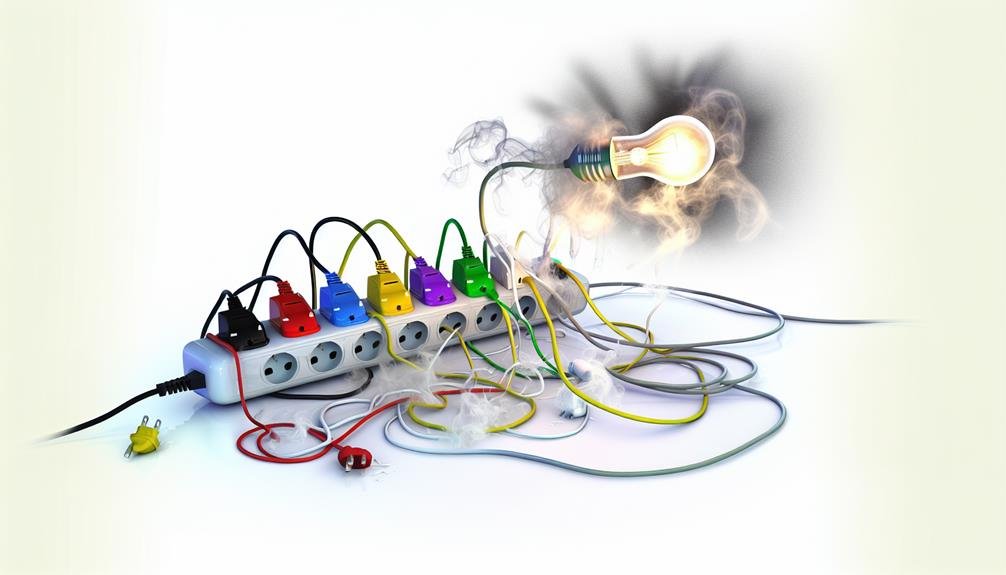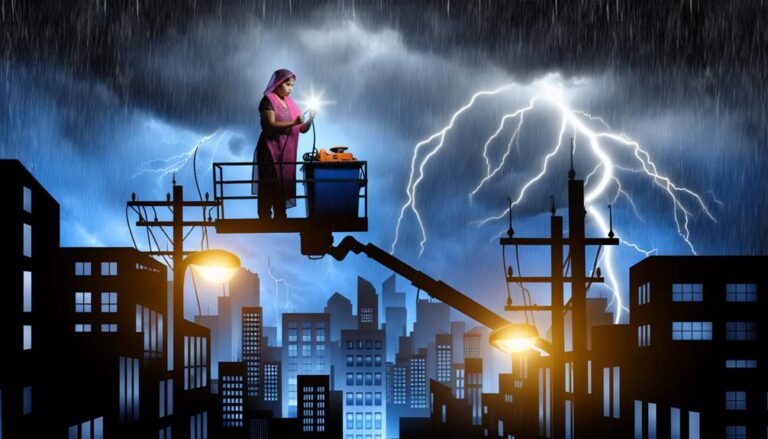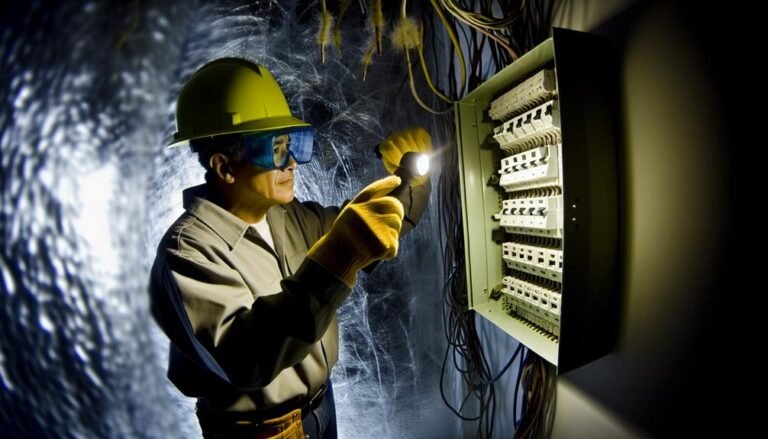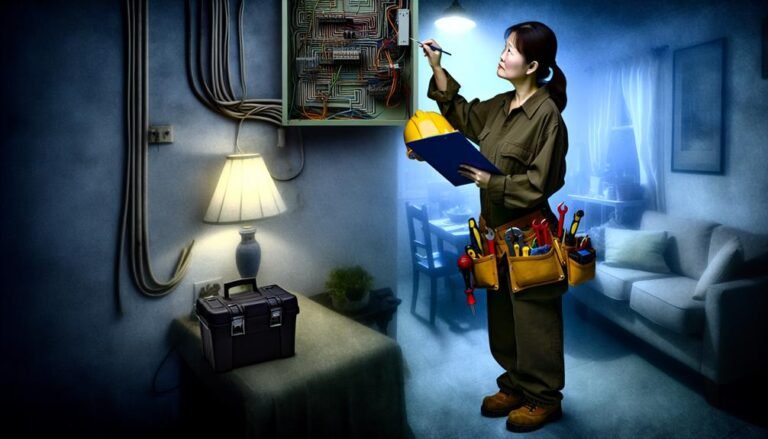Common Electrical Emergencies and How to Prevent Them
You’ve probably heard the saying, ‘An ounce of prevention is worth a pound of cure.’ When it comes to electrical emergencies, this adage couldn’t be more true. From power outages to electrical fires, knowing how to prevent these common emergencies can save you time, money, and potentially even your life.
But where do you start? In this discussion, we’ll explore some of the most common electrical emergencies and provide you with practical tips on how to avoid them.
So, if you want to ensure a safe and hassle-free experience with your electrical systems, stay tuned.
Key Takeaways
- Power outages can be reported to utility providers for information on restoration times.
- Regular inspections and maintenance of electrical systems can help prevent electrical fires.
- Electric shock can be avoided by using professional installation and GFCIs, and keeping electrical appliances away from water sources.
- Understanding electrical load capacity and distributing it across circuits can prevent overloading. Regular inspections and prompt repairs can address faulty wiring issues.
Power Outages
During power outages, it’s crucial to take immediate action to ensure your safety and mitigate potential risks. When the power goes out, it’s important to remain calm and follow these steps to minimize any inconvenience or danger.
First, check if the outage is affecting your entire neighborhood or just your home. If it’s only your home, check the circuit breaker panel to see if any breakers have tripped. Resetting the breakers may restore power.
If the outage is widespread, contact your utility provider to report the outage and inquire about the estimated time of restoration. In the meantime, it’s recommended to unplug any electronic devices to protect them from power surges when the power comes back on. Additionally, avoid opening your refrigerator or freezer to keep the food inside from spoiling.
If necessary, use flashlights or battery-powered lanterns instead of candles to prevent fire hazards. Finally, if the power outage lasts for an extended period, consider moving to a designated emergency shelter or a friend’s house that has power.
Electrical Fires
To effectively address electrical fires, it’s crucial to understand the common causes and potential dangers associated with them.
Electrical fires can occur due to various reasons, such as faulty wiring, overloaded circuits, or misuse of electrical equipment. When electrical current exceeds the capacity of the wiring, it can generate heat, leading to sparks and eventually igniting flammable materials nearby. Additionally, electrical fires can be caused by damaged or frayed cords, which can create a short circuit and trigger a fire. It’s essential to be cautious when using electrical devices and avoid overloading outlets or extension cords.
The potential dangers of electrical fires are numerous. They can cause property damage, injuries, or even fatalities. Electrical fires can spread rapidly and release toxic fumes, posing a significant risk to occupants. Additionally, these fires can disrupt power supply, leading to power outages and further complications.
Preventing electrical fires requires proactive measures. Regularly inspecting and maintaining electrical systems, including wiring, outlets, and appliances, is crucial. Avoid using damaged cords or plugs and refrain from running electrical cords under carpets or rugs. Install smoke detectors and fire extinguishers to detect and control fires promptly. Educate yourself and your family members on electrical safety practices.
Electric Shock
Electric shock is a potentially life-threatening event that occurs when a person comes into contact with an electrical current. It’s important to understand the causes, symptoms, and prevention measures associated with electric shock.
Causes of Electric Shock:
- Direct contact with exposed electrical wires or live electrical equipment.
- Accidental contact with water or wet surfaces while using electrical appliances.
- Faulty wiring or electrical installations that can lead to the leakage of electrical current.
Symptoms of Electric Shock:
- Tingling or numbness in the affected area.
- Muscle contractions or spasms.
- Burns or visible injury at the contact point.
- Difficulty breathing or chest pain.
- Loss of consciousness or cardiac arrest.
Prevention Measures:
- Ensure all electrical installations are done by qualified professionals and regularly inspected.
- Use Ground Fault Circuit Interrupters (GFCIs) in areas where water is present.
- Avoid using electrical appliances near water sources.
- Always unplug electrical devices before cleaning or performing maintenance.
- Educate yourself and others about electrical safety and the dangers of electric shock.
Overloaded Circuits
Overloaded circuits can pose serious safety risks and should be addressed promptly to prevent electrical hazards. An overloaded circuit occurs when too many electrical devices are connected to a single circuit, drawing more current than it can handle. This can result in overheating and even electrical fires.
To avoid overloading circuits, it’s crucial to understand the electrical load capacity of each circuit in your home. Each circuit has a specific amp rating, which indicates the amount of current it can safely handle. It’s important not to exceed this rating. To determine the maximum load, add up the wattage of all the devices connected to the circuit. Remember to take into account both the continuous and intermittent loads.
To prevent overloading, consider redistributing the electrical load across different circuits. Plug high-energy-consuming appliances, such as refrigerators or air conditioners, into dedicated circuits. Use power strips with built-in circuit breakers to protect against overloads. Additionally, avoid using extension cords for long-term or high-energy devices.
Regularly inspect your electrical system for signs of overloading, such as flickering lights, tripped circuit breakers, or warm outlets. If you suspect an overloaded circuit, consult a qualified electrician to assess and resolve the issue promptly.
Taking proactive measures to prevent overloaded circuits will help ensure the safety and efficiency of your electrical system.
Faulty Wiring
If you suspect that your electrical system may have faulty wiring, it’s crucial to address this issue promptly to prevent potential safety hazards. Faulty wiring can lead to electrical fires, electrocution, and damage to your electrical appliances.
To ensure your safety and the proper functioning of your electrical system, consider the following:
- Regular Inspection: Schedule regular inspections of your electrical system by a qualified electrician. They’ll assess the condition of your wiring and identify any potential issues before they become major problems.
- Proper Installation: Ensure that all electrical wiring is installed correctly and in accordance with local building codes. Faulty installation can lead to short circuits, overheating, and electrical malfunctions.
- Prompt Repairs: If you notice any signs of faulty wiring such as flickering lights, burning smells, or frequent tripping of circuit breakers, don’t ignore them. Contact a licensed electrician immediately to diagnose and repair the issue.
© 2026 By Electrician Phoenix Today






